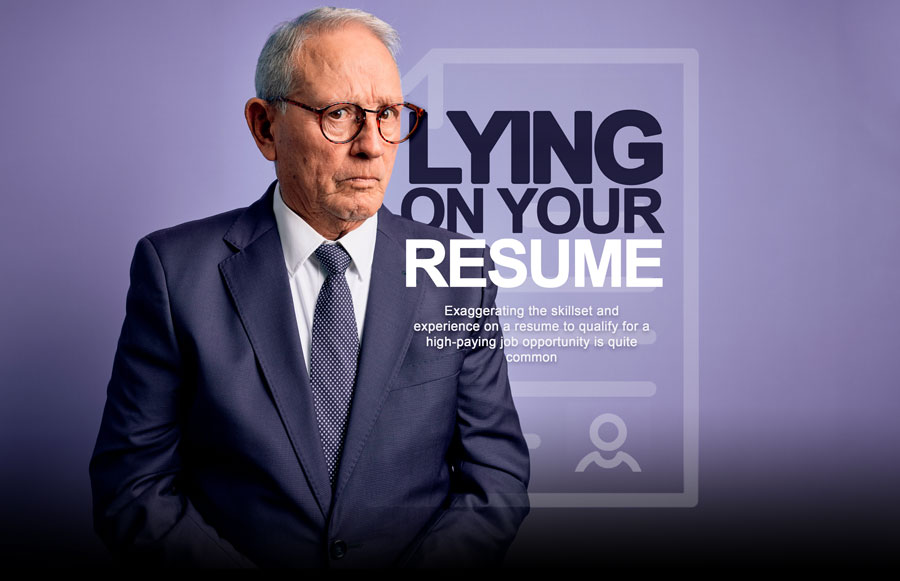How to Identify if a Candidate Lied on Their Resume

Exaggerating the skillset and experience on a resume to qualify for a high-paying job opportunity is quite common. For instance, a candidate applying for a job may claim they possess expertise in a specific technology field, despite limited or no actual demonstrated experience.
Failure to recognize these misrepresentations can blow-out recruitment and selection process costs. In Australia, the average cost per hire is $21,000 and this cost almost doubles when recruiters make bad hiring decisions and end up turning over employees because they are not the right fit for the role from an expertise or cultural perspective.
What Happens When Inflated or Fake Resumes Go Unnoticed
Job seekers may lie on their CVs in different ways, such as:
• Lie about skills and work experience
• Hide employment gaps by lying about the length of previous jobs
• Lie about academic degrees when they dropped out before finishing the program
• Fake job titles or achievements
• Fake references so recruiters can’t verify their employment history or performance
• Made up contact information
Since it’s not always easy to detect lies without background checks, recruiters may end up hiring an employee who lacks the necessary expertise required for the job, and as a consequence, compromise the efficacy of the recruitment process whilst adding significantly to the overall recruitment costs.
Such employees often fail to meet the inherent core competencies of the role and may defer or delegate challenging tasks to colleagues or subordinates. This may have a negative flow on effect to staff morale who question the competency of their fellow team member.
When other team members have to work overtime to cover for the struggling employee, it becomes challenging to be productive and achieve sales and performance targets. Moreover, the high cost of replacing the employee further adds to the organisation’s financial predicament.
Therefore, the key to avoiding the hassle of dealing with bad hiring decisions is to streamline the recruitment and selection process so it’s easier to identify whether job seekers lied on their resume.
How to Identify Lies on a Resume
Vague Information about Job Roles
Job candidates highlight skills they have learnt and tasks they excelled at during previous jobs to stand out amongst the candidate pool. But it can be a red flag if there’s vague and unclear information on a resume.
Such candidates may add unnecessary thesaurus-like words, use industry-specific jargon out of context, and tend to generalize in their description of their experience since they don’t have specific or depth of knowledge about the field.
So, if you go ahead with an interview, make sure you ask them to share in-depth and specific information about their experience and responsibilities.
The Information Doesn’t Add Up
Nowadays, a majority of professionals actively use professional networking platforms to communicate with other professionals and apply for job posts. So, it doesn’t take long for recruiters to verify the information on resumes through a quick online background search.
However, if you notice that the information on the resume doesn’t reflect the information on these platforms, then it can be a warning sign.
However, keep in mind there’s a possibility that the profile is old, and the user didn’t add up-to-date information or skipped adding information about certain degrees or jobs. A detailed background check by private investigators can assist you in finding answers.
Employment Dates Don’t Seem Genuine
Recruiters tend to consider employment gaps a major problem, so some job seekers may manipulate employment tenure or dates to cover up this gap.
When candidates intend to lie to recruiters, they may list down their employment history by year instead of mentioning the dates and months when they joined and left. Although it doesn’t necessarily mean they are lying, a little digging can clarify the situation.
The Resume Seems Too Good to be True
Furthermore, another warning sign is when a resume seems too good to be true. For instance, the employee might have moved too quickly through the designations even though it’s not common in the industry.
Does the resume depict that the candidate is working in an Executive position a few years after completing their university degree? Then this may be a case of inflated job titles and the person may not be honest about their employment history.
The Reference List is Unreachable
When an employee lies about their skills, employment, and education, they may hesitate in sharing references since former employers and managers can reveal the truth. So, when it comes to fake resumes, there is usually no reference information available or the contact information isn’t genuine.
If you try to contact references through the information, you may notice the person is unreachable or the contact number or email address isn’t in use.

Employment Background Checks Can Save You the Trouble
Over 80% of recruiters in Australia use Applicant Tracking Systems (ATS) to screen and shortlist candidates interested in a job. Despite the use of state-of-art technology, it’s not always easy to identify whether a candidate is honest or lied about their employment history or educational background to secure a job position simply by looking at the resume document.
Therefore, background checks can assist in verifying the information. The best option is to hire a PI for this purpose since they are equipped with tools and experienced at gaining access to databases and information that isn’t easily accessible.
They would also reach out to the reference list and contact relevant people such as the former employer of the candidate and their educational institutes to verify the information.
Moreover, private investigators can guide you about conducting effective recruitment interviews where you can ask questions to clarify ambiguities or discrepancies about their employment and skills. You can ask scenario-based behavioural questions to ascertain how they tackled difficult situations as well as conduct a skill test to verify their expertise.
All in all, Pre-employment Background Checks are invaluable for verifying the information on a resume and to ensure optimal integrity in the candidate screening and selection process.






















